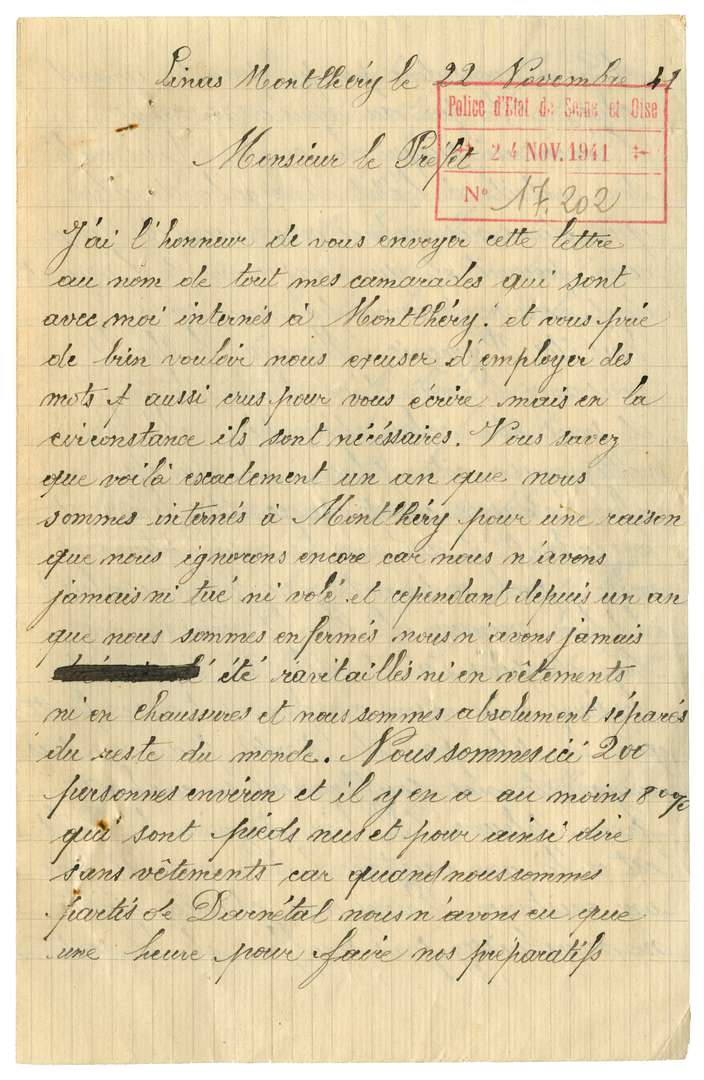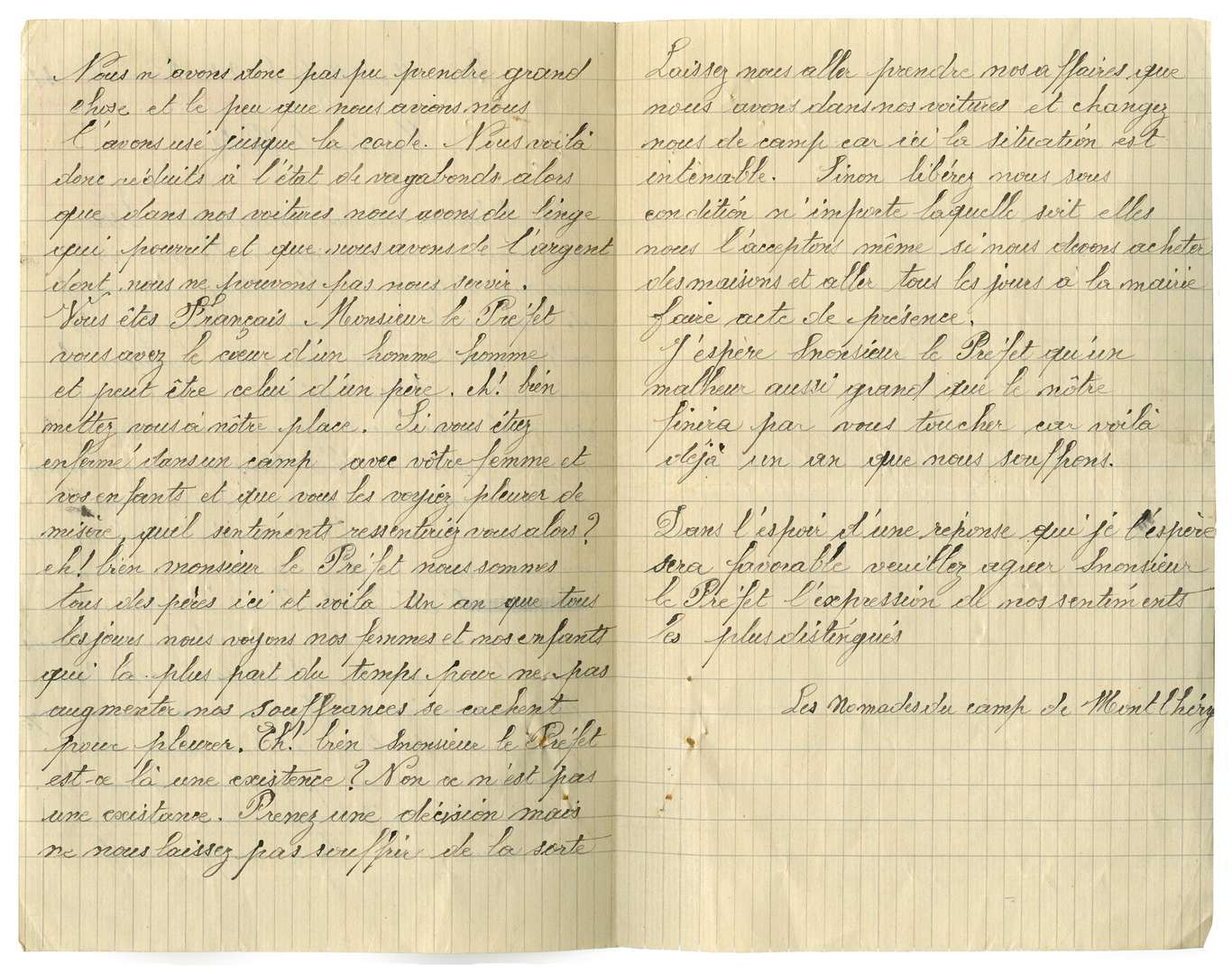Linas Montlhéry, 22 November 1941
Dear Prefect,
I have the honour, on behalf of my comrades who are interned with me in Montlhéry, to address this letter to you and request that you excuse our drastic words, but given the circumstances they are necessary. As you know, we have been interned here in Montlhéry for exactly a year now, but we don’t know the reason, we’ve never murdered or stolen, and yet we’ve been incarcerated for the past year, are given neither food rations nor clothes nor shoes and are fully cut off from the rest of the world. There are about 200 of us and at least 80% are barefoot and practically without any clothes, because when were forced to leave Darnétal, we were given only an hour’s notice.
We therefore couldn’t take much with us, and the little that we had has since been completely used up. Consequently, we’ve been reduced to the state of beggars, particularly because the clothes in our wagons are rotting and we can’t make any use of the money we have.
You are a Frenchmen, Monsieur Prefect, and have the heart of a human being and perhaps that of a father as well. Now put yourself in our position! If you were incarcerated in a camp, with your wife and your children, and you see them crying because of the misery they have to endure, how would you feel? Now, Monsieur Prefect, we are all fathers here and for the past year we have seen, day in and day out, how our wives and our children, so as to not increase our suffering, hide their tears from us. Is that, Monsieur Prefect, a life? No, that is not a life. Make a decision, but don’t let us go on suffering like this.
Allow us to retrieve our belongings from our wagons and change camps, for the situation here is simply untenable. If not, release us under conditions that we, no matter what they are, accept, even if it means that we have to sell our houses and report to the town hall every day.
I hope that you, Monsieur Prefect, will put an end to a misery that is as great as ours because it touches you that we have been suffering like this for a year already.
In the hope of receiving an answer that, I hope, will be in our favour, we remain with the greatest respect,
The ‘nomads’ of the Montlhéry camp
»Wir sind in Montlhéry interniert, den Grund kennen wir nicht«
Anonym | »Wir sind in Montlhéry interniert, den Grund kennen wir nicht« | self-evidence | France (German occupied zone) | Nov. 21, 1941 | voi_00006
Rights held by: unknown | Provided by: Yvelines Departement Archive (Montigny-le-Bretonneux/France) | Archived under: 300 W 81
Linas Montlhéry le 22 novembre 1941
Monsieur le Préfet
J’ai l’honneur de vous envoyer cette lettre au nom de tout mes camarades qui sont avec moi internés à Montlhéry et vous prie de bien vouloir nous excuser d’employer des mots aussi crus pour vous écrire mais en la circonstance ils sont nécessaires. Vous savez que voilà exactement un an que nous sommes internés à Montlhéry pour une raison que nous ignorons encore car nous n’avons jamais ni tué ni volé et cependant que depuis un an nous sommes enfermés nous n’avons jamais été ravitaillés ni en vêtements ni en chaussures et nous sommes absolument séparés du reste du monde. Nous sommes ici 200 personnes environ et il y en a au moins 80 % qui sont pieds nus et pour ainsi dire sans vêtements car quand nous sommes partis de Darnétal nous n’avons eu que une heure pour faire nos préparatifs.
Nous n’avons donc pas pu prendre grand-chose et le peu que nous avions nous l’avons usé jusqu’à la corde. Nous voilà donc réduits à l’état de vagabonds alors que dans nos voitures nous avons du linge qui pourrit et que nous avons de l’argent dont nous ne pouvons pas nous servir.
Vous êtes Français Monsieur le Préfet vous avez le cœur d’un homme et peut être celui d’un père. Eh ! bien mettez vous à notre place. Si vous étiez enfermé dans un camp avec vôtre femme et vos enfants et que vous les voyiez pleurer de misère, quel sentiments ressentiriez vous alors ? eh bien monsieur le Préfet nous sommes tous des pères ici et voila un an que tous les jours nous voyons nos femmes et nos enfants qui la plus part du temps pour ne pas augmenter nos souffrances se cachent pour pleurer. Et ! bien Monsieur le Préfet est-ce là une existence ? Non ce n’est pas une existence. Prenez une décision mais ne nous laissez pas souffrir de la sorte.
Laissez nous allé prendre nos affaires dans nos voitures et changez nous de camp car ici la situation est intenable. Sinon libérez nous sous condition n’importe laquelle soit elles nous l’acceptions même si nous devons acheter des maisons et aller tous les jours à la mairie faire acte de présence.
J’espère Monsieur le Préfet qu’un malheur aussi grand que le nôtre finira par vous toucher car voilà déjà un an que nous souffrons.
Dans l’espoir d’une réponse qui sera je l’espère favorable veuillez agréer Monsieur le Préfet l’expression de nos sentiments les plus distingués.
Les nomades du camp de Montlhéry
Linas Montlhéry, den 22. November 1941
Sehr geehrter Herr Präfekt,
Ich habe die Ehre, im Namen meiner Kameraden, die mit mir in Montlhéry interniert sind, diesen Brief an Sie zu richten und bitte darum, unsere drastischen Worte zu entschuldigen, aber angesichts der Umstände sind sie erforderlich. Sie wissen, dass wir nun genau ein Jahr lang in Montlhéry interniert sind, den Grund kennen wir nicht, denn wir haben nie gemordet oder gestohlen, und doch sind wir seit einem Jahr eingesperrt, werden weder mit Lebensmitteln, noch mit Kleidung oder Schuhen versorgt und sind vollkommen von der übrigen Welt abgeschottet. Wir sind hier zu ungefähr 200 Personen und mindestens 80 % sind barfuß und praktisch ohne Kleidung, denn als wir in Darnétal aufbrechen mussten, hatten wir nur eine Stunde Zeit, um Vorbereitungen zu treffen.
Wir haben daher nicht viel mitnehmen können, und das Wenige, das wir hatten, haben wir vollständig aufgebraucht. Wir sind folglich auf den Zustand von Bettlern reduziert, zumal die Wäsche in unseren Wagen vergammelt und wir von dem Geld, das wir besitzen, keinen Gebrauch machen können.
Sie sind ein Franzose, Herr Präfekt, und haben das Herz eines Menschen und vielleicht auch das eines Vaters. Und nun versetzen Sie sich in unsere Lage! Wenn Sie in einem Lager eingesperrt wären, mit Ihrer Frau und Ihren Kindern, und Sie diese aufgrund der Not weinen sehen, welche Gefühle würden Sie dann empfinden? Nun, Herr Präfekt, wir alle hier sind Väter, und seit einem Jahr sehen wir tagtäglich, wie unsere Frauen und unsere Kinder, um unser Leid nicht zu steigern, ihre Tränen vor uns verstecken. Also, Herr Präfekt, ist das ein Leben? Nein, das ist kein Leben. Treffen Sie eine Entscheidung, aber lassen Sie uns nicht auf diese Art und Weise leiden.
Erlauben Sie uns, unser Hab und Gut aus unseren Wagen zu holen und das Lager zu wechseln, denn hier ist die Situation unhaltbar. Falls nicht, befreien Sie uns unter Bedingungen, die wir, egal welcher Art sie sind, akzeptieren, selbst wenn wir Häuser kaufen und jeden Tag im Rathaus vorstellig werden müssten.
Ich hoffe, Herr Präfekt, dass ein Elend, das so groß wie das unsere ist, durch Sie beendet werden wird, weil es Sie berührt, dass wir schon seit einem Jahr leiden.
In der Hoffnung auf eine Antwort, die, so hoffe ich, zu unseren Gunsten ausfallen wird, verbleiben wir in vorzüglicher Hochachtung,
Die »Nomaden« des Lagers Montlhéry
Linas Montlhéry, 22. Novembri 1941
Drago Raj Prefekto,
Si man paćiv, ko anav mire maribaske amalengo, save si manca phangle ko Montlhéry, te bičhalav akava lil dži Tute, te rodav Tutar te jertisares amare vakarde bilačhe vorbe, numa varekana telal varesavo pecipe gasave vorbe šaj te vakarrdon. Sar so džanes amen sam phangle si jekh berš akate ko Montlhéry, numa na džanas soske sam pangle, amen nikana na mudardam varekas vaj vareso čorrdam, ba akate sam phangle kotar o nakhlo berš, na den amen ni xabe, uravipe vaj palem kundre, čhinde sam avral kotar e sasti luma. Amen sam akate džikaj 200 manuša thaj majcera 80% si nange thaj praktikanes bi uravimata, soske kana samas tradine te mukas o Darnétal, numa jekh časo sas amen vrama te ovas gata.
Kodoleske amen našti lijam vareso but amenca thaj kodo cera so sas amen ki vrama gelas. Odothar amen sam akana sar manuša so mangen, e uravimata ke amare vordona kernjon thaj amare lovenca našti khanči vareso te keras.
Tu san jekh Francuzo, Raj Prefekto, si Tu ilo lačhe manušesko, šaj avelas vi jekhe dadesko. Thaj čhuv Tu pe amaro than! Te ovesa Tu phanglo ko Lager te romnjasa thaj čhavenca, te dikhesa len sar roven ko adava pharipe, so haćaresa Tu? Akana, Raj Prefekto, amen savore akate sam dada thaj si jekh berš sar amen sako dives dikhas sar amare rromnja thaj čhavorre, garudine amender roven, te na buteder dukhaven amen. Si kodo trajo, Raj Prefekto? Na, kodo naj trajo. Ker vareso, numa na muk amen kada majdureder te crdas.
De amenge te irisaras palpale amaro so si amen, amare šeja andar amare vordona, thaj te paruvas o Lager, soske i situacija akate si but phari, našti te astarrdolpe. Te na, muk amen pe slobodija telal savo go keripe manges, so te si amen ka keras, vi khera ka kinas thaj sako dives ko forosko kher ka mothadivas te trubul.
Me paćav, Raj Prefekto, kaj jekh čororipe, baro sar kaj si amaro, Tutar ka agoril, kaj Tu šaj haćares, kaj amen akate kotar jekh berš cidas.
Sunimasa vaš jekh mothovipe, savo amare lačhimaske, paćav, mišto ka ovol, aćhas bare paćivalimasa.
E phirutne kotar o Lager Montlhéry
Credits
Rights held by: unknown | Provided by: Yvelines Departement Archive (Montigny-le-Bretonneux/France) | Archived under: 300 W 81
Playlist
Contextualisation
Petition by the internees of the Montlhéry camp
In November 1940, 184 ‘Gypsies’ (French travelling performers and Roma, who had been living in the Seine-Inférieure area since the 1920s) were arrested in Rouen and its surrounds and then interned in a disused textile factory in Darnétal. Because the Seine-Inférieure department was classified as a coastal area and hence prohibited for ‘Gypsies’, the 184 people were put into livestock railway wagons and transported to the Linas-Montlhéry camp, located on the outskirts of Paris, on 26 November 1940.
The Linas-Montlhéry camp had been built on the grounds of a famous racetrack. Administered by the police while French gendarmes were responsible for guard duties. The living conditions were extremely difficult; the families suffered from cold and hunger. In numerous letters to the prefects responsible for the camp, the internees complained about the injustice of their situation, accused the administrator and his wife of misappropriation, and demanded their release. On 21 April 1942, the 200 internees of the Linas-Montlhéry camp were taken to the Mulsanne (Sarthe) camp, from where they were to be deported to the largest camp for ‘Gypsies’ in France, located in Montreuil-Bellay (Maine-et-Loire).
The families, who came from northern France and Belgium, were released in the summer of 1943 and assigned quarters close to the camp. Despite a travel ban, they returned to their places of origin, where they were fatefully arrested at the end of 1943 and deported to Auschwitz.
Playlist
Details
- Ulrich Marx (Speaker German)
- xident (Production Company)
- Steve Hudson (Speaker English)
- Nedjo Osman (Speaker Romani)
- Anonym (Author) (Montlhéry, France (German occupied zone))









